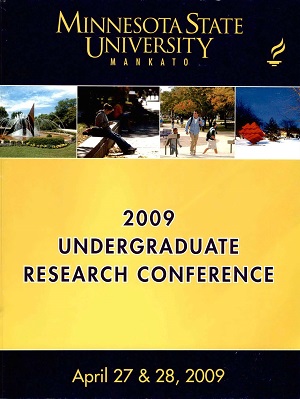Is Chemical Warfare a Mode of Invasion of Reed Canary Grass (Phalaris arunduacea) in Wetlands?
Location
CSU Ballroom
Start Date
28-4-2009 10:00 AM
End Date
28-4-2009 12:00 PM
Student's Major
Biological Sciences
Student's College
Science, Engineering and Technology
Mentor's Name
Beth Proctor
Mentor's Department
Biological Sciences
Mentor's College
Science, Engineering and Technology
Description
Reed Canary Grass (Phalaris arunduacea) (RC) is an invasive species and a major threat to natural wetlands in Minnesota. The purpose of this research was to determine if root extracts of RC reduce the germination of several wetland plants' seeds (Rice Cut Grass, Reed Manna Grass; River Wild Rye). The RC was germinated and grown in individual containers in a mixture of upland soil and sand for 5 months. For 3 months twenty plants were feed once a week with 0.015 mg Nitrogen using a commercial fertilizer containing 15%N-5%P-15%K. Another group of twenty plants were feed once a week with 0.15 mg Nitrogen. The plants were harvested, and biomass was determined. Roots were groimd and different amounts of roots were extracted with methanol. Methanol extracts of RC roots grown with other wetland plants has been found to reduce the germination of lettuce seeds. The methanol root extracts were placed into individual Petri dishes lined with filter paper. The methanol was allowed to evaporate. Then seeds (10- 20) from each native wetland plant were placed into a Petri dish and 10 ml of water were added. The dishes were incubated at 22-25C under a 14 hour light/10 hour dark cycle. At the end of expected germination period plus 2 days, the numbers of seed that did and did not germinate were recorded. All experiments were done in triplicate and controls were also run. Results from these experiments will be presented.
Is Chemical Warfare a Mode of Invasion of Reed Canary Grass (Phalaris arunduacea) in Wetlands?
CSU Ballroom
Reed Canary Grass (Phalaris arunduacea) (RC) is an invasive species and a major threat to natural wetlands in Minnesota. The purpose of this research was to determine if root extracts of RC reduce the germination of several wetland plants' seeds (Rice Cut Grass, Reed Manna Grass; River Wild Rye). The RC was germinated and grown in individual containers in a mixture of upland soil and sand for 5 months. For 3 months twenty plants were feed once a week with 0.015 mg Nitrogen using a commercial fertilizer containing 15%N-5%P-15%K. Another group of twenty plants were feed once a week with 0.15 mg Nitrogen. The plants were harvested, and biomass was determined. Roots were groimd and different amounts of roots were extracted with methanol. Methanol extracts of RC roots grown with other wetland plants has been found to reduce the germination of lettuce seeds. The methanol root extracts were placed into individual Petri dishes lined with filter paper. The methanol was allowed to evaporate. Then seeds (10- 20) from each native wetland plant were placed into a Petri dish and 10 ml of water were added. The dishes were incubated at 22-25C under a 14 hour light/10 hour dark cycle. At the end of expected germination period plus 2 days, the numbers of seed that did and did not germinate were recorded. All experiments were done in triplicate and controls were also run. Results from these experiments will be presented.
Recommended Citation
Veit, Jordy. "Is Chemical Warfare a Mode of Invasion of Reed Canary Grass (Phalaris arunduacea) in Wetlands?." Undergraduate Research Symposium, Mankato, MN, April 28, 2009.
https://cornerstone.lib.mnsu.edu/urs/2009/poster-session-C/11




